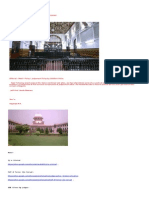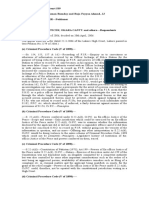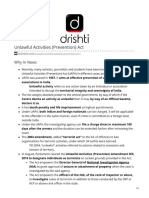Notice US 160 CRPC
Notice US 160 CRPC
Uploaded by
Soumelini RoutCopyright:
Available Formats
Notice US 160 CRPC
Notice US 160 CRPC
Uploaded by
Soumelini RoutOriginal Title
Copyright
Available Formats
Share this document
Did you find this document useful?
Is this content inappropriate?
Copyright:
Available Formats
Notice US 160 CRPC
Notice US 160 CRPC
Uploaded by
Soumelini RoutCopyright:
Available Formats
Notice under section 160 of Cr.P.C.
Sec.160 of Cr.P.C.
T'olbce oficer's power to require attendance of witnesses
1 An polwr offieer making an imvestigatinn undor this
by
C'hapter may
order in writing. reqire the atfendance heforo himaelf of any
person being within the limits of his nwn or any adjoining atation who.
from the information given or otherwise.
appears to he acquainted
wth the facts and ireumstances of the case and auch
perarn ahall
attend as so required
Provided that no male person under the age of fifteen yeara or above
the age of
sixty five years or a woman or a mentally or physically
disabled person' shall be required to attend at any place other than
the place in which such male
person or woman resides.
2 The State Government may, by rules made in this be half. provide
for the payment by the police officer of the rea sonable expenses of
every person, attending under sub section (1) at any place other than
his residence.
Criminal Law (Amendment) Act, 2013
Points to note
Rank: Any police officer
Purpose: For investigation
Form of notice: Written
Requiring the attendance of any person being within the limits
of his own or any adjoining station who, from the information
given or otherwise
Witness to be acquainted with the facts and circumstances of the
case
The Police Office should not secure attendance of the tollowing
person at the Police Station
Male person under the age of fifteen years
oMale person above the age ofsixty-five years
A woman
A mentally or physically disabled person
oThey shall be required toattend at any place other than the
place in which such male person or woman resides
The Notice should necessarily contain the following details
o Name, address and parentage details of the witness
o Case Reference
Non conmplance of summons u/s 160 Cr.P.C. is an offence punisna
under Section 174 IPC of the Indian Penal Code, 1860.
Section 174 of IPC:
Non attendance in obedience to an order from publicservant.
Whoever, being legally bound to attend in person or by an agent at
certain place and time in obedience to a
summons, notice, order o
proclamation proceeding from any public servant legally competent, as
such public servant, to issue the same, intentionally omits to attend at
that place or time, or departs from the place where he is bound to
attend before the time at which it is lawful for him to depart, shall be
punished with simple imprisonment for a term which may extend to
one month, or with fine which may extend to five hundred rupees, or
with both, or, if the summons, notice, order or proclamation is to attend
in person or by agent in a Court of Justice, with simple imprisonment
for a term which may extend to six months, or with fine which may
extend to one thousand rupees, or with both.
Whether summon under Section 160 of Cr P.C can be served upon a
personresidingin other District/State?
I t is quite clear from the language used in Section 160 of the
Criminal Procedure Code, that a police officer making an
investigation has the power to summon only a person who is
within the limits of his own police station or within the limits of
anyadjoining police station.
A police officer has no power to summon a witness who is not
within the aforesaid limits of the same police station or any
adjoining police station.
different state or in a
Therefore, if a witness is residing in a
different district or is an outside witness, he cannot be
summoned by the police officer conducting the investigation, to
appear before him.
witness is, comes within
However, if the area, within which such
even if that may be in
the limits of the adjoining police station,
such witness may be summoned by
some other state or district,
is pertinent to point out that
the police officer. In this regard, it
Bhadur And Anr. vs The State Off
in the case of Krishan Bans
Nawwwwen mounauclesRvATWYA ******UVNNOD
wANwwrTAvIrATw*A**www *****
wwwwww Ww*wwA*w****** **
a t e and time f
appearanee
Addss nf th Palire hefor the Polire (ffre
Stntinn
Name of the
Investigating Officer
Contact details of the
Investignting Offirer
Non compliance with order under Section 160 of
Non comphance of summons n/s
160
Cr.P.C.
under Section 174 11C of 1he
Indian
CrPCis an offenee puniana ble
Penal Code, 1860.
Section 174 of IPC:
Non attendance in
obedience to
Whoever. being legally bound toan order from public servant.
certain place and attend in person or by an agent at a
time in obedience
to a summons,
proclamation proceeding notice, order vi
from any public
such servant legally competent, as
publie servant, to issue the same,
that place or time, intentionally omits to attend at
attend
or
departs from
before the time at which
the place where he is bound t
it is lawful for him to
punished with simple imprisonment for a depart, shall pe
one month, or
with fine which
term which may extend to
with both. or, if the may extend to five hundred rupees, or
summons, notice, order or
in person or
by agent in a Court of Justice, with proclamation is to attend
for a term which
may extend to six months, or with
simple imprison ment
extend to one thousand fine which may
rupees, or with both.
Whether summon under Section 160 of Cr.P.C. can be
person residing in other District / State? served upon a
I t is quite clear from the language used in Section 160
of the
Criminal Procedure Code, that a
police officer making an
investigation has the power to summon only a person who is
within the limits of his own police station or within the
limits of
any adjoining police station.
A police officer has no
power to summon a witness who is not
within the aforesaid limits of the same police station or
any
adjoining police station.
Therefore, if a witness is residing in a different state or in a
different district or is an outside witness, he cannot be
summoned by the police officer conducting the investigation, to
appear before him.
However, if the area, within which such witness is, comes within
thelimits of the adjoining police station, even if that may be in
some other state or district, such witness may be summoned by
the police officer. In this regard, it is pertinent to point out that
in the case of Krishan Bans Bhadur And Anr. vs The State Of
imachnl 'radesh on 21 May, 1971 an order wa iNSod under
Sretion 160 of the Code of Criminal Proceduro requiring the
pofitioners to preRent themselvea nt Police Station Chhota Simla
Distriet Simla in connection with the investigation ofa case, Tho
rder was served on them nt New Delhi. The petitioners were
mable to attend at the Police Station in compliance with the
Order.
Consequently, a charge sheet wAs submitted against the
petitioners for an offence under Section 174 of the Indian Penial
Code.
n the circumstances, the Himachal Pradesh High Court held as
under:
"Clearly the petitioners are not guilty of any non compliance
with the orders issued under Section 160 ofthe Code of Criminal
Procedure. Section 160 empowers a police officer making an
investigation to require the attendance before himself of any
person being within the limits of his own or any adjoining
station" who from the information given or other wise appears to
be acquainted with the circumstances of the case and Section 160
adds, such person must attend as so required. From the record of
the present case it is apparent that when the orders under S. 160
of the Code of Criminal Procedure were issued the petitioners
were not within the limits ofthe police Station ofthe police ofticer
15Suing the order, nor ofany adjoining station. The address ofthe
petitioners mentioned in the order indicates that they were
present at New Delhi. There is no evidence whatever to show
that they were in Simla at all. Ex acie, the order under Section
160 of the Code of Criminal Procedure is without jurisdiction.
The order did not proceed from a public servant legally
competent as such public servant to issue it. Accordingly, no
offence can be said to have been committed within the purview
of Section 174 of the Indian Penal Code."
Anirudha S.Bhagatva Ramnivas MeenaAnd Anr.on20 April, 2005
Bombay High Court
The petitioner challenges the summonses issued to the petitioner
by the Investigating Agency on two grounds, namely that the
Investigating Agency has no jurisdiction or power to issue
summons to a person residing or carrying on business beyond the
territorial limits of the police station to which the Investigating
Agency is attached and secondly that summons for production of
document can only be issued under Section 91 of the Codeof
Criminal Procedure and not under Section 160 thereof. On both
You might also like
- Stages of Criminal Trial in India - 6Document6 pagesStages of Criminal Trial in India - 6Yoosuf SafwanNo ratings yet
- CRPCDocument34 pagesCRPCPrithumit Deb100% (1)
- Investigation StageDocument8 pagesInvestigation StageUroosha IsmailNo ratings yet
- Police Diary and General DiaryDocument6 pagesPolice Diary and General Diarysaptarshi mukhopadhyayNo ratings yet
- Case DiaryDocument6 pagesCase DiaryMomi MomiNo ratings yet
- E-Book - PanchnamaDocument14 pagesE-Book - PanchnamaPrasanth Peruvayal PrasanthNo ratings yet
- Unnao Rape CaseDocument14 pagesUnnao Rape CaseAnonymous 1Ye0Go7KuNo ratings yet
- Unnao Rape OrderDocument7 pagesUnnao Rape OrderNeeraj ChawlaNo ratings yet
- 302ipc ChallanDocument21 pages302ipc ChallanAnil SharmaNo ratings yet
- Stages of CrimeDocument241 pagesStages of Crimedeepika mitraNo ratings yet
- Annexure-3 (B) IO Handbook New LawsDocument90 pagesAnnexure-3 (B) IO Handbook New LawsSourabh JainNo ratings yet
- Aghnoo Nagesia Vs State of BiharDocument14 pagesAghnoo Nagesia Vs State of BiharManuKharraNo ratings yet
- What Is A PanchnamaDocument4 pagesWhat Is A PanchnamaGyan Prakash100% (1)
- Tihar Jail ReportDocument8 pagesTihar Jail ReportMebanjop SunNo ratings yet
- Dying DeclarationDocument16 pagesDying DeclarationSneha ANo ratings yet
- Ram Bahadur ThapaDocument4 pagesRam Bahadur ThapaMohandas PeriyasamyNo ratings yet
- Theft Robbery DacoityDocument5 pagesTheft Robbery DacoityNARINDERNo ratings yet
- Judgments - of - Supreme - Court - On - NDPS Act 1985Document55 pagesJudgments - of - Supreme - Court - On - NDPS Act 1985Jishnu V JNo ratings yet
- Bharatiya Nagarik Suraksha Sanhita, 2023Document20 pagesBharatiya Nagarik Suraksha Sanhita, 2023researchdomain1008No ratings yet
- Delhi HC Judgment On Appearance of Accused Before PoliceDocument15 pagesDelhi HC Judgment On Appearance of Accused Before PoliceLatest Laws TeamNo ratings yet
- Study Material Criminal Procedure Code B.A.Ll.B. (Hons) Viii Semester Unit 4 A. Cognizance by Court (SS. 190-199)Document9 pagesStudy Material Criminal Procedure Code B.A.Ll.B. (Hons) Viii Semester Unit 4 A. Cognizance by Court (SS. 190-199)Akasa SethNo ratings yet
- Cheating and Forgery CaseDocument14 pagesCheating and Forgery CaseSatyendra Chauhan100% (1)
- Police Head ConstableDocument30 pagesPolice Head ConstableMaheshrok NagaNo ratings yet
- Match Fixing by Judges & PoliceDocument193 pagesMatch Fixing by Judges & PoliceNagaraja Mysuru RaghupathiNo ratings yet
- Cr.P.C.Synopsis - Unit IDocument6 pagesCr.P.C.Synopsis - Unit ISuraj Srivatsav.SNo ratings yet
- Six Rights of Rape VictimsDocument2 pagesSix Rights of Rape VictimspriyaNo ratings yet
- What Is The Law Regarding Processes To Compel The Production of Documents and Other Movable Property, CRPC, 1973?Document7 pagesWhat Is The Law Regarding Processes To Compel The Production of Documents and Other Movable Property, CRPC, 1973?aradhana fartyalNo ratings yet
- Section 161 of Criminal Procedure CodeDocument5 pagesSection 161 of Criminal Procedure CodeAnkita ChaurasiyaNo ratings yet
- Difference Between Summary and Regular Trial PDFDocument29 pagesDifference Between Summary and Regular Trial PDFmohit kumarNo ratings yet
- Framed Damned and Acquitted Dossiers of A Very Special CellDocument180 pagesFramed Damned and Acquitted Dossiers of A Very Special CelltheseductivecharacterNo ratings yet
- Case No 392.2022Document20 pagesCase No 392.2022sourav choudhuryNo ratings yet
- Bharatiya Nagarik Suraksha Sanhita CRPC 98066507Document9 pagesBharatiya Nagarik Suraksha Sanhita CRPC 98066507archanasmuraleedharanNo ratings yet
- Q. Write A Short Note On FIR. Discuss The Guidelines Laid Down by The Supreme Court For Mandatory Registration of FIR in Lalita Kumari's CaseDocument3 pagesQ. Write A Short Note On FIR. Discuss The Guidelines Laid Down by The Supreme Court For Mandatory Registration of FIR in Lalita Kumari's CaseshareenNo ratings yet
- Abetment Case BriefsDocument6 pagesAbetment Case BriefsAryan YashpalNo ratings yet
- Dr. Absarul Hasan Kidwai Dept. of Law AMU: F.I.R - Silent Features Evidentiary Value of F.I.RDocument47 pagesDr. Absarul Hasan Kidwai Dept. of Law AMU: F.I.R - Silent Features Evidentiary Value of F.I.RAkasa SethNo ratings yet
- First InformationDocument20 pagesFirst InformationLoveleen PandayNo ratings yet
- Assignment of Indian Penal Code (1860) Topic Criminal TrespassDocument9 pagesAssignment of Indian Penal Code (1860) Topic Criminal Trespassroger12 soiNo ratings yet
- 12 - Chapter 5 PDFDocument55 pages12 - Chapter 5 PDFKaushal YadavNo ratings yet
- Bail Exceptional Cases RefusalDocument1 pageBail Exceptional Cases RefusalJudicial AspirantNo ratings yet
- Kathua Rape Case PresentationDocument19 pagesKathua Rape Case PresentationSougata SahaNo ratings yet
- Seminar Topic Sentencing in White Collar CrimeDocument24 pagesSeminar Topic Sentencing in White Collar CrimePraveen b s ChettyNo ratings yet
- FIRDocument180 pagesFIRSaddy MehmoodbuttNo ratings yet
- Art 20Document8 pagesArt 20Abhijit TulsankarNo ratings yet
- MK Slide PDFDocument26 pagesMK Slide PDFPrabakaran NrdNo ratings yet
- CRPC BALB3001 Course Module PDFDocument14 pagesCRPC BALB3001 Course Module PDFAnuj DwivediNo ratings yet
- Full Concept PDFDocument11 pagesFull Concept PDFRohit SaabNo ratings yet
- Major Changes in CRPCDocument23 pagesMajor Changes in CRPCkarthikNo ratings yet
- Unlawful Activities (Prevention) Act: Why in NewsDocument2 pagesUnlawful Activities (Prevention) Act: Why in NewsHarsh TiwariNo ratings yet
- 1st Day of September 2019Document5 pages1st Day of September 2019Anil SharmaNo ratings yet
- Subordinate Courts: The Judiciary Chapter-I: Chapter-IIDocument20 pagesSubordinate Courts: The Judiciary Chapter-I: Chapter-IIAbdul Halim PiashNo ratings yet
- Crimes - NotesDocument14 pagesCrimes - NoteskrishahNo ratings yet
- Constitu Part CDocument20 pagesConstitu Part Cplannernar100% (1)
- DuressDocument13 pagesDuressMaizaRidzuan0% (1)
- Preamble & Articles 12 To 24Document158 pagesPreamble & Articles 12 To 24Gourav KumarNo ratings yet
- Family LawDocument5 pagesFamily LawVaibhavi AgrawalNo ratings yet
- Comparative Table Between BNA and Evidence ActDocument13 pagesComparative Table Between BNA and Evidence ActRaja LingamNo ratings yet
- Section 160 Deals With Police Officer's Power To Require Attendance of WitnessesDocument23 pagesSection 160 Deals With Police Officer's Power To Require Attendance of WitnessesAkasa SethNo ratings yet
- Proclaimed Offender - FAQsDocument3 pagesProclaimed Offender - FAQsgnsr_1984No ratings yet
- Section 161-162: of Tamil Nadu, 2005 SC Where A Godman WasDocument7 pagesSection 161-162: of Tamil Nadu, 2005 SC Where A Godman WasAvinash ChoudharyNo ratings yet
- Sec. 156Document40 pagesSec. 156alihossain armanNo ratings yet
- Ra 11648Document16 pagesRa 11648Danica Inciso100% (2)
- Law of Crimes II CRPCDocument6 pagesLaw of Crimes II CRPCVidushi MishraNo ratings yet
- I. Exemptions 1.1. Insanity / Imbecility: Crim 1 SyllabusDocument2 pagesI. Exemptions 1.1. Insanity / Imbecility: Crim 1 SyllabusJohn Rey FerarenNo ratings yet
- 18LLB104 - CRPC SynopsisDocument3 pages18LLB104 - CRPC SynopsisVijay Srinivas KukkalaNo ratings yet
- Gmail - Complaint Against Threatening, NuisanceDocument2 pagesGmail - Complaint Against Threatening, NuisanceAtul MishraNo ratings yet
- Criminal Law: Department of Criminal Law Faculty of Law, University of IndonesiaDocument7 pagesCriminal Law: Department of Criminal Law Faculty of Law, University of IndonesiacalebNo ratings yet
- LRS Midterm ReviewerDocument12 pagesLRS Midterm ReviewerCABILING, LORILYNNo ratings yet
- Ibrahim, Mahad IndictmentDocument48 pagesIbrahim, Mahad IndictmentWSYX/WTTENo ratings yet
- Slide 1:: Script: Under The Section 9 of RA 9514, The Fire Hazard Shall Be Abated Immediately. As A Responsible Owner NGDocument4 pagesSlide 1:: Script: Under The Section 9 of RA 9514, The Fire Hazard Shall Be Abated Immediately. As A Responsible Owner NGtylersilas.acadcommisionNo ratings yet
- Pro Reo Principle: Gatchalian, G.R. No. L-12011-14 (1958) ) in Dubio Pro ReoDocument4 pagesPro Reo Principle: Gatchalian, G.R. No. L-12011-14 (1958) ) in Dubio Pro ReoMikaela DeguitoNo ratings yet
- Assignment Sample IPCDocument6 pagesAssignment Sample IPCkanithansivaNo ratings yet
- NoticeDocument3 pagesNoticesem4bctNo ratings yet
- 1.) 1 Phil 437 US Vs ABADDocument1 page1.) 1 Phil 437 US Vs ABADGlim VaveeNo ratings yet
- Course Outline 2Document13 pagesCourse Outline 2Ayush SrivastavaNo ratings yet
- Peoria County Booking Sheet 10/03/15Document10 pagesPeoria County Booking Sheet 10/03/15Journal Star police documentsNo ratings yet
- National University of Study and Research in Law Ranchi, Jharkhand 2019Document10 pagesNational University of Study and Research in Law Ranchi, Jharkhand 2019Anushka SaratheNo ratings yet
- Notice of Hearing 1Document2 pagesNotice of Hearing 1Abasi Talib BeyNo ratings yet
- Gov Uscourts Almd 82723 1 0Document2 pagesGov Uscourts Almd 82723 1 0Libby EmmonsNo ratings yet
- Jerry Harris Facing New Child Pornography, Sex Crime ChargesDocument8 pagesJerry Harris Facing New Child Pornography, Sex Crime ChargesWGN Web Desk100% (1)
- Ipc Project 6th SemDocument13 pagesIpc Project 6th SemsahilNo ratings yet
- Crime of Passion ThesisDocument5 pagesCrime of Passion Thesisrokafjvcf100% (2)
- Law of TortsDocument51 pagesLaw of TortsBharathi S VNo ratings yet
- 30 Articles of UN DECLARATION of Human RightsDocument2 pages30 Articles of UN DECLARATION of Human Rightsalmanan040No ratings yet
- Waiting For The Barbarians SummaryDocument3 pagesWaiting For The Barbarians SummaryRashail Naaz0% (1)
- NSTP Bill of RightsDocument3 pagesNSTP Bill of RightsJea Daeniel EspirituNo ratings yet
- Dennis v. United States - 341 U.S. 494 (1951) - Justia US Supreme Court CenterDocument83 pagesDennis v. United States - 341 U.S. 494 (1951) - Justia US Supreme Court CenterAlisha VergaraNo ratings yet
- US v. TRONODocument1 pageUS v. TRONOjon_macasaetNo ratings yet
- Spof 6211 Learning Unit 5 Powerpoint Slides - Crimes Against Dignity and Reputation - 2021Document18 pagesSpof 6211 Learning Unit 5 Powerpoint Slides - Crimes Against Dignity and Reputation - 2021PoopNo ratings yet
- Rule 126-127 SYLLABUS: CASE LISTDocument2 pagesRule 126-127 SYLLABUS: CASE LISTisabellegivNo ratings yet

























































































